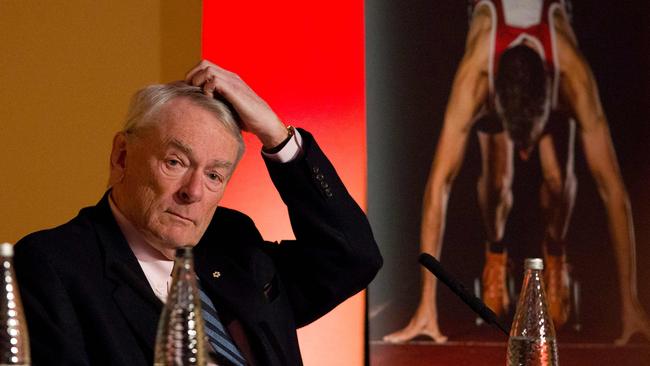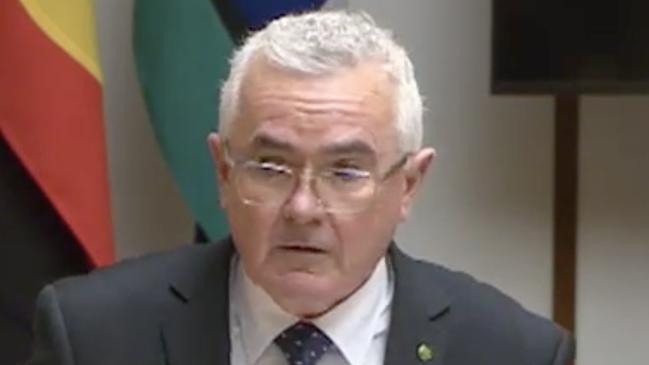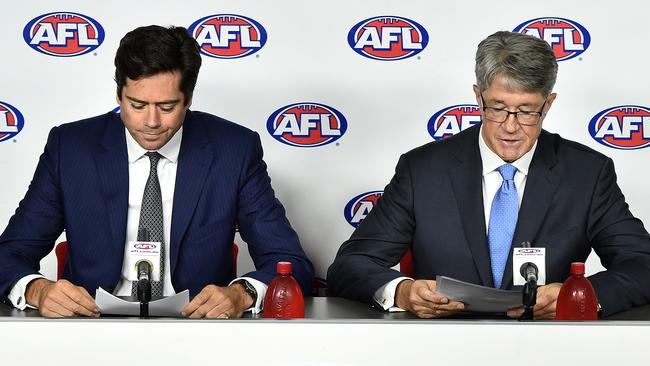Anti-doping expert Dick Pound likens AFL drug policies to East Germany’s doping programs
One of the world’s most respected anti-doping voices has likened the AFL’s secret drug testing regime to the methods of East Germany in the 20th century, calling on Australian police to become involved.
AFL
Don't miss out on the headlines from AFL. Followed categories will be added to My News.
One of the world’s most respected anti-doping experts has likened the AFL’s secret drug testing regime to East Germany’s notorious state-run programs that allowed a generation of cheats to avoid getting busted.
Dick Pound, the founding president of the World Anti-Doping Agency (WADA), has slammed the clandestine AFL program and called on Australian police to look for links between players and organised crime gangs that may be supplying illicit drugs, including cocaine.
“If it’s a prohibited drug in the sense of criminal law, you probably should get your police authorities to start investigating that,” Pound said.
“They can follow the drugs both from their source and their destination and you can get some criminal and convictions for that.
“They could, in a sense, take it out of the hands of the AFL if that’s become problematic.”
The AFL has strongly denied any wrongdoing around its ‘off the books’ policies and procedures, which only came to light last week through whistleblower and independent MP Andrew Wilkie but have sparked widespread outrage and led to calls for heads to roll.

The AFL says its clandestine drug testing practices are protecting the best interests of players but Pound, sport’s staunchest anti-drugs crusader, isn’t buying any of it.
On the contrary, the Canadian lawyer says the AFL is openly flouting the rules by employing the same underhand tactics that Eastern-bloc countries used during the Cold War to prevent Olympic athletes from being caught with anabolic steroids in their bodies.
“This is not the first time that this kind of conduct has occurred, but it completely undoes the underlying rationale of clean athletes where you get a get out of jail card free,” Pound said.
“This goes back 45 years in the Montreal harbour during those 1976 Games.
“The Warsaw Pact countries had a ship and on the ship were two fully completed or fully operative laboratories.
“On the day before the competition, they would bring them in for testing, mostly for steroids in those days, and if they were going to test positive the next day, they were encouraged to be sick or have an injury and not participate.
“So the result was no East German, no Russian ever got caught doping because they were pre-tested the day before the competition. So this is using old Soviet techniques in 2024.”
A fearless critic of rich professional sports that have been reticent about testing and sanctioning players, Pound has a long history of calling out the AFL.

In 2005, he publicly opposed the AFL’s decision to set up its own illicit drugs policy rather than adopt the WADA Code, and also spoke out during the Essendon supplements scandal a decade later, which led to the suspensions of 34 players.
The AFL eventually relented and adopted the WADA Code in 2006, amid fears it would lose government funding, but Pound said something was amiss with the AFL’s current illicit drugs policy if team doctors were now helping players evade detection on game days under a system allegedly authorised and facilitated by the league.
“Drug testing is not meant to be unofficial,” he said.
“There are certainly rules about the entourage messing with the tests and that’s certainly what they’re doing. If they test and find that an athlete tests positive, there’s an obligation to report on that and for the consequences to follow.
“Clearly that is not in the spirit or the rule of the (WADA) Code and if the AFL was really interested in making sure that they were Code compliant, they would get an opinion from WADA whether ‘if we do this, is this bad or good? Is this an anti-doping rule violation?”
But former chairman of Australia’s anti-doping agency Richard Ings praised the AFL for allowing players to be stood down if they are positive to midweek drugs tests.
Ings said: “The AFL is absolutely allowed to do this. And it’s a very good thing what the AFL is doing, and they’ve been doing it for 20 years.’’

Ings was chairman of ASADA, now known as Sports Integrity Australia, from 2006-2010.
“It’s not circumventing the WADA (World Anti-Doping Agency), rules, it’s going above and beyond the WADA rules. WADA does not stop the AFL doing this,” he said.
WADA and Sport Integrity Australia have so far declined to comment on the scandal.
Pound said the AFL’s approach reminded him of the way North America’s professional sports leagues reacted to him when he first floated the idea of players being tested for drugs the same way Olympians were.
“I got some letters back from them saying ‘we already have the best possible anti-doping programs in place. And by the way, why don’t you piss off and look after your own shop and not ours?’” Pound said.
Unfazed, the former International Olympic Committee vice-president persevered.
Now, nearly all sports and governments are signatories to the WADA Code, though the rules differ between performance and recreational drugs.
Although illicit drugs are banned, anti-doping officials can only test for recreational drugs on match days, which is why AFL players are able to avoid being busted if they are warned in advance they might fail.
But Pound said party drugs such as cocaine were known to be banned substances so sports should not wash their hands if they were aware of players using them.
“I think they’re missing the point,” Pound said.
“It’s on the list.”
More Coverage
Originally published as Anti-doping expert Dick Pound likens AFL drug policies to East Germany’s doping programs




